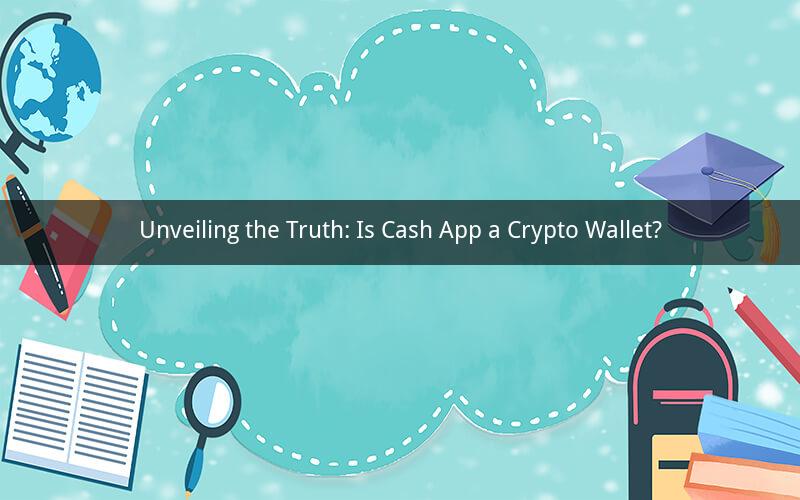
Introduction:
In the ever-evolving world of cryptocurrencies, the debate over the functionality of Cash App as a crypto wallet has sparked intense discussions among users and experts alike. While some argue that Cash App offers a seamless integration of cryptocurrency services, others question its true nature as a crypto wallet. This article delves into the intricacies of Cash App, exploring its features, limitations, and the ongoing debate regarding its classification as a crypto wallet.
I. Understanding Cash App
A. What is Cash App?
Cash App is a mobile payment service launched in 2015 by Square, Inc. It allows users to send, receive, and store money, as well as invest in stocks and cryptocurrencies. The app has gained popularity for its user-friendly interface and integration with various financial services.
B. Key Features of Cash App
1. Peer-to-Peer Payments: Users can easily send and receive money from friends, family, and businesses.
2. Direct Deposit: Users can receive their salary, tax refunds, and other payments directly into their Cash App account.
3. Stock Trading: Users can buy and sell stocks through the Cash App platform.
4. Bitcoin Buying and Selling: Cash App allows users to purchase and sell Bitcoin, catering to the growing interest in cryptocurrencies.
II. The Crypto Wallet Debate
A. What is a Crypto Wallet?
A crypto wallet is a digital tool used to store, send, and receive cryptocurrencies. It comes in various forms, including hardware wallets, software wallets, and mobile wallets. The primary function of a crypto wallet is to secure private keys, which are essential for accessing and controlling digital assets.
B. Cash App as a Crypto Wallet
1. Is Cash App a Crypto Wallet?
While Cash App offers Bitcoin buying and selling functionalities, it is not classified as a traditional crypto wallet. This is due to several reasons:
a. Limited Storage: Cash App does not provide the ability to store cryptocurrencies offline, which is a crucial feature of most crypto wallets.
b. Lack of Private Key Control: Users do not have direct control over their private keys, which are required to access and manage their cryptocurrencies.
c. Focus on Financial Services: Cash App's primary focus is on financial services, including peer-to-peer payments, direct deposit, and stock trading, rather than solely on cryptocurrency storage and management.
III. Pros and Cons of Using Cash App for Cryptocurrency
A. Pros
1. User-Friendly Interface: Cash App offers a simple and intuitive interface, making it easy for users to navigate and perform transactions.
2. Integration with Financial Services: The integration of stock trading and other financial services provides users with a comprehensive financial platform.
3. Accessibility: Cash App is available on both iOS and Android devices, making it accessible to a wide range of users.
B. Cons
1. Limited Storage: The inability to store cryptocurrencies offline increases the risk of losing funds in the event of a security breach.
2. Lack of Privacy: Users do not have full control over their private keys, which may raise privacy concerns.
3. Reliance on Square, Inc.: As a service provided by Square, Inc., Cash App's security and reliability depend on the parent company's infrastructure and policies.
IV. Alternatives to Cash App as a Crypto Wallet
A. Hardware Wallets
Hardware wallets are physical devices designed to store cryptocurrencies offline, providing enhanced security. Examples include Ledger Nano S and Trezor Model T.
B. Software Wallets
Software wallets are digital applications available on various devices, including smartphones, desktops, and laptops. Examples include Exodus, MetaMask, and MyEtherWallet.
C. Mobile Wallets
Mobile wallets are specifically designed for smartphones and offer convenience and accessibility. Examples include Trust Wallet, Atomic Wallet, and Coinomi.
V. Conclusion
In conclusion, Cash App is not a traditional crypto wallet. While it offers Bitcoin buying and selling functionalities, its primary focus lies in financial services rather than cryptocurrency storage and management. Users seeking enhanced security, offline storage, and privacy should consider alternative crypto wallets, such as hardware wallets, software wallets, or mobile wallets. By understanding the limitations of Cash App and exploring suitable alternatives, users can make informed decisions regarding their cryptocurrency holdings.
Questions and Answers:
1. Q: Can I transfer Bitcoin from my Cash App account to a different wallet?
A: Yes, you can transfer Bitcoin from your Cash App account to a different wallet. However, you will need to provide the recipient's wallet address and enter the amount you wish to transfer.
2. Q: How secure is Cash App for storing cryptocurrencies?
A: Cash App employs various security measures, including end-to-end encryption and two-factor authentication. However, it is important to note that Cash App is not a traditional crypto wallet, and the security of your cryptocurrencies depends on the platform's infrastructure and policies.
3. Q: Can I withdraw my Bitcoin from Cash App to a bank account?
A: Yes, you can withdraw your Bitcoin from Cash App to a bank account. The process involves converting your Bitcoin to US dollars and then transferring the funds to your linked bank account.
4. Q: Is Cash App a regulated platform for cryptocurrency transactions?
A: Yes, Cash App is a regulated platform for cryptocurrency transactions. Square, Inc., the parent company of Cash App, complies with various financial regulations and operates under a license from the New York State Department of Financial Services (NYDFS).
5. Q: Can I use Cash App to buy other cryptocurrencies besides Bitcoin?
A: Currently, Cash App only supports the purchase and sale of Bitcoin. However, the platform may introduce support for other cryptocurrencies in the future.